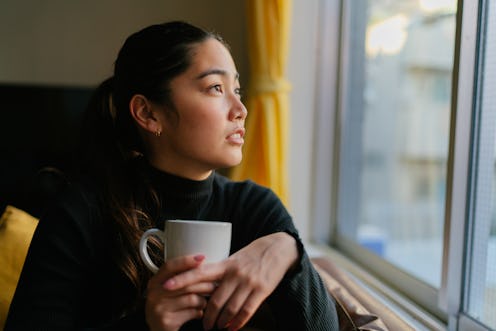Health
Why Does Caffeine Make Me Feel Stressed?
Is that Slack notification or your double-shot latte making your heart race?

The cute barista at your coffee shop is super impressed by your daily French press, but it’s also making you so shaky you can barely type by 1 p.m. While your morning brew may be a beloved way to wake up, caffeine can make you feel stressed, particularly if you’re already prone to anxiety.
“I tried to get into coffee, but I had to come off it because it seemed to make me nervy,” Hannah, 32, tells Bustle. “I’d get jittery and feel weird and unsettled.” Too much caffeine can even bring on “coffee intoxication,” which will feel familiar if your texts to the group chat feel a little rambling after your second espresso.
“Although caffeine is considered safe for consumption, it can pose a problem for many reasons,” Dr. Seema Sarin M.D., director of lifestyle medicine at EHE Health, tells Bustle. “In moderation, caffeine is fine, but in excess, it can cause health complications such as anxiety and insomnia.”
How Caffeine Affects Your Stress Levels
Why does coffee make you stressed? Basically, it goes straight to the adenosine receptors in your brain, heart, and elsewhere, making you more awake and vigilant. It also activates the pituitary gland, encouraging it to release adrenaline — the hormone that causes you to go into “fight or flight” mode. That’s why you’re suddenly able to crush your expense report after a strong latte, but it’s also why you might feel nervous that not all your “business lunches” will get approved. In fact, if you drink a lot of coffee, you might become less able to cope with stress over time; a 2021 study published in Molecular Psychiatry found regular coffee drinkers had fewer connections in the parts of their brains related to emotional processing.
Your genes could also mean you’re more vulnerable to coffee-related stressing. A study in Frontiers in Psychiatry in 2017 found that some people’s caffeine receptors are super sensitive, meaning they get those stress effects after drinking less matcha. Even if you don’t carry that gene, the study noted that as little as 200mg of caffeine a day can cause anxiety. (Eight ounces of coffee has around 130mg.) That said, a lot of studies about coffee and stress center on people who already have anxiety disorders, which might skew how people without anxiety can relate to the results.
Can Caffeine Make You More Stressed?
Caffeine can indirectly cause more stress than it helps, Dr. Sarin says. If you’re drinking a lot of caffeine and find yourself tossing and turning, or just plain old not sleeping, that can affect your day-to-day mood. “This can manifest in the form of stress, anxiety, or depression depending on the individual and situation,” Dr. Sarin says.
Still, some evidence shows that when you’re stressed, small amounts of caffeine might actually help. A study published in Physiology & Behavior in 2017 found that when people who were stressed were given a low dose of caffeine, they did better on thinking-heavy tasks and felt less anxious. A small latte — or, according to a 2019 study, a matcha cookie — could help reduce your stress levels.
The key, boringly enough, appears to be moderation. If you’ve noticed your daily cold brews seem to correspond with sky-high anxiety, you might want to consider downgrading to a less intense caffeine punch. Your barista will understand.
Experts:
Dr. Seema Sarin M.D.
Studies cited:
Kasimay Cakir, O., Ellek, N., Salehin, N., Hamamcı, R., Keleş, H., Kayalı, D. G., Akakın, D., Yüksel, M., & Özbeyli, D. (2017). Protective effect of low dose caffeine on psychological stress and cognitive function. Physiology & behavior, 168, 1–10. https://doi.org/10.1016/j.physbeh.2016.10.010
Magalhães, R., Picó-Pérez, M., Esteves, M. et al. (2021) Habitual coffee drinkers display a distinct pattern of brain functional connectivity. Molecular Psychiatry. https://doi.org/10.1038/s41380-021-01075-4
Richards, G., & Smith, A. (2015). Caffeine consumption and self-assessed stress, anxiety, and depression in secondary school children. Journal of psychopharmacology (Oxford, England), 29(12), 1236–1247. https://doi.org/10.1177/0269881115612404
van Son, D., Schalbroeck, R., Angelidis, A., van der Wee, N., van der Does, W., & Putman, P. (2018). Acute effects of caffeine on threat-selective attention: moderation by anxiety and EEG theta/beta ratio. Biological psychology, 136, 100–110. https://doi.org/10.1016/j.biopsycho.2018.05.006
Temple, J. L., Bernard, C., Lipshultz, S. E., Czachor, J. D., Westphal, J. A., & Mestre, M. A. (2017). The Safety of Ingested Caffeine: A Comprehensive Review. Frontiers in psychiatry, 8, 80. https://doi.org/10.3389/fpsyt.2017.00080
Unno, K., Furushima, D., Hamamoto, S., Iguchi, K., Yamada, H., Morita, A., Pervin, M., & Nakamura, Y. (2019). Stress-reducing effect of cookies containing matcha green tea: essential ratio among theanine, arginine, caffeine and epigallocatechin gallate. Heliyon, 5(5), e01653. https://doi.org/10.1016/j.heliyon.2019.e01653